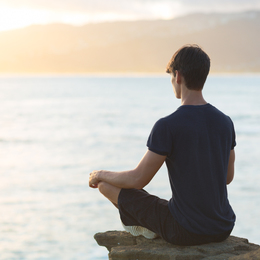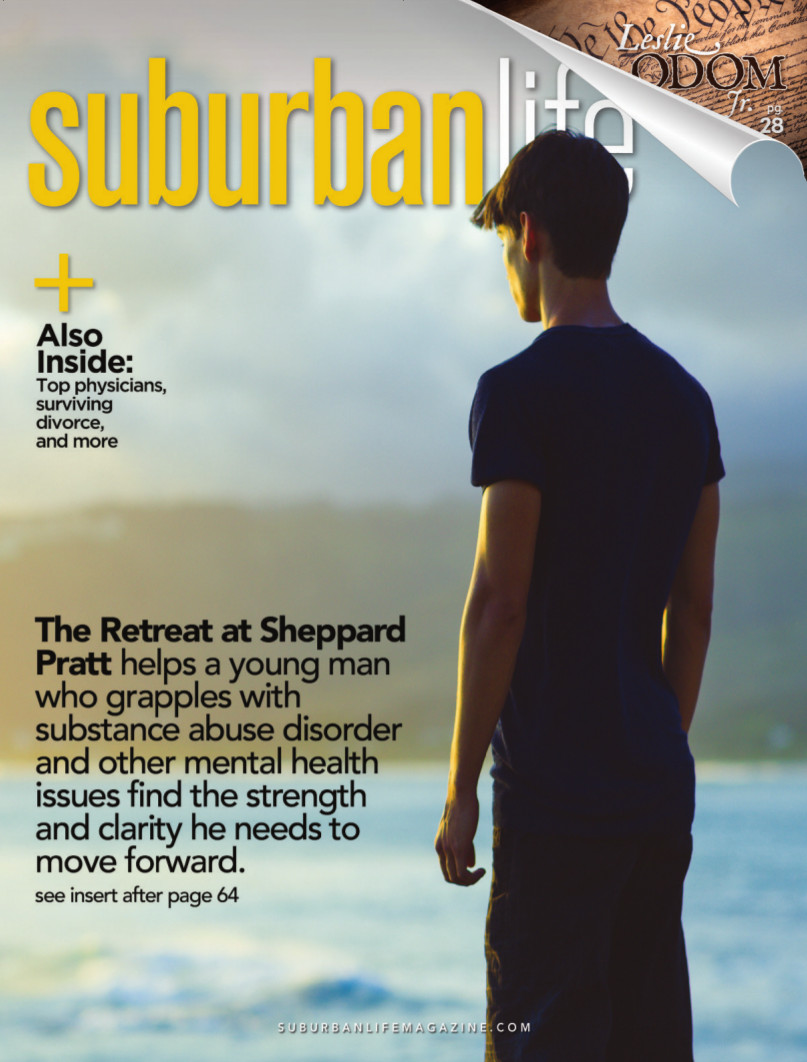
The Journey Continues
At The Retreat at Sheppard Pratt, individuals who grapple with substance abuse disorder and other mental health issues find the strength and clarity they need to move forward.
Chris Rogers* grew up in Berkeley, California, east of San Francisco. He remembers his childhood as idyllic, mostly, though his life took a dramatic turn in fifth grade.
“I have vivid memories of my mom starting to struggle with alcohol,” Rogers recalls. “The harder thing was to see the pain and shame that she carried. My father, brother, and I all knew it was becoming a problem. By the time I was in sixth grade, things started to become unmanageable.”
Rogers says his mother also developed a strange “obsession” with his school. Despite several warnings from the school administration to modify her behavior, she continued her harassment. As a result, Rogers was forced to transfer elsewhere. He refers to this period as “the first bit of trauma in my life.”
It would, however, hardly be the last.
Rogers’ mother sought treatment for her alcoholism. She wanted to get healthy and bring her family closer together. In the end, she was unable to tame her demons. Her downward spiral led her to die by suicide in 2015.
“She jumped off the Golden Gate Bridge,” Rogers recalls. “I was 16 at the time, the summer going into my fourth year of high school. I needed to apply to colleges, so it was easy for me to focus on that and let the emotional implications of what happened come second.”
Rogers chose to attend the University of North Carolina at Chapel Hill, on the other side of the country, far from the trauma he had endured in California. He “loved” the school and made friends easily, but the permissive culture associated with campus life took its toll. He did cocaine for the first time as a freshman, and he found it all too easy to feed a growing appetite for drugs and alcohol.
“I had a good experience, but sometimes I was isolated,” he recalls. “It was easy to say, ‘Let’s drink beer and have a good time,’ and forget about everything else. Another part of me saw how that could cripple a psyche.”
In late 2019, as he prepared for his final year of college, Rogers felt invigorated about the promise of his future. He had participated in a work-study program doing advocacy work for the clean energy sector—a personal passion of his. Even so, he was largely unaware of the fact that he was becoming unmoored. Drugs and alcohol had become part of his daily routine. He had also begun to resent his friends for not understanding, acknowledging, or even knowing about the pain he had experienced earlier in his life.
The people closest to him—his father and brother, as well as his fraternity brothers—were unnerved by the abrupt changes in him.
“I was doing more drugs, always animated, never sleeping, [and] my relationships with my peers started to break down,” he remembers. “I went back to school on August 16, and by mid-September I was getting calls and texts, confronting me, saying, ‘We don’t know you like this, and we’re concerned for you.’ I knew the volatility was there, but I didn’t think it was something that would persist.”
On October 30, two police officers confronted him outside his fraternity house and showed him a court order that suggested he was a danger to himself or to others. The officers took him to stabilize at a nearby hospital, where he stayed for nearly two weeks. While he was there, he came to grips with his situation. A kind soul who worked at the hospital helped him research facilities that could offer the specialized treatment he needed to get well.
In the process he learned about The Retreat at Sheppard Pratt, located in Baltimore, Maryland. The Retreat offered a residential treatment program for individuals dealing with an array of mental health problems, including substance use disorder. He left the hospital and entered The Retreat in November. The Retreat’s medical team placed him on a co-occurring disorders track, to treat his underlying mental health disorder as well as his struggles with drugs and alcohol.
“At that time of my life, for me to be in a treatment facility was a pretty big hurdle to get over,” he says. “I had the overwhelming feeling of ‘Thank God I’m in a place where I have my own bed and my own clothes’—that was my first thought, that I was safe. It took a few weeks to realize this was where I needed to be.”
Filling the Void
Miles Quaytman, M.D., an attending psychiatrist at The Retreat, was Rogers’ primary physician and psychotherapist during his inpatient stay. He remembers Rogers presenting as “manic, irritable, and angry,” but beneath that he saw “an interesting and highly intelligent young man.” In the course of a comprehensive evaluation, Dr. Quaytman diagnosed Rogers with bipolar disorder and treated the disorder with lithium. The medication prompted “a very good response.”
“In addition to bipolar disorder, he had to deal with issues of trauma and substance abuse,” Dr. Quaytman says. “A 16-year-old kid is not psychologically equipped to deal with something like a mother’s suicide, so he dealt with it by avoiding it. It’s one of the reasons he went to school in North Carolina, to get away from it all. But the past was always close behind, and he kept the emotional pain at bay with the use of drugs.”
As an active participant in The Retreat’s co-occurring disorders track, Rogers began to work through the issues that had led him to such a low point in his life. The medication certainly helped, but a combination of individual psychotherapy with Dr. Quaytman three times a week, intensive group therapy, and family therapy, as well as the fellowship and support of a 12-step program such as Narcotics Anonymous, taught him to process his feelings and understand the motivations behind his behaviors. He says going through the process alongside other people in similar situations—including another young man who attended the University of Virginia—was invaluable.
Denise Connelly, LCSW-C, MAC, CAC-AD, has fond memories of Rogers from his time at The Retreat. As an addiction therapist, she worked closely with him to “do the healing and soul searching” needed to understand his disease and visualize a life in which he could stay sober.
“I called him my star student,” she says. “He’s humble, he stands up for what he believes in, he cares about people, and he has a good conscience. His parents raised an awesome kid who turned into an awesome adult. He’s exceptional because of the kind of person he is—articulate and well spoken, someone who’s taken responsibility for his own actions, and someone who is willing to do the work required to overcome his addiction.”
Connelly says people come to addiction through various means. For some, it’s to counteract feelings of low self-esteem or self-worth. Others look to blunt the pain of past traumas. Some just like the way their substance of choice makes them feel.
“It’s also a very common theme among people sharing that they just feel like they didn’t belong,” she adds. “Drugs and alcohol become a safety blanket, false courage, and many people find they don’t have a sense of well-being without it. The disease fills a void inside; it plugs a hole. The problem is that it doesn’t solve anything.”
As someone who has been in recovery for several years, Connelly speaks from experience.
“A lot of people have co-occurring issues, and that piece of the puzzle needs to be addressed professionally,” she adds. “If you have something like bipolar disorder, it needs to be treated with medication and therapy. If [Rogers] went somewhere else, just to get his bipolar disorder taken care of, if he didn’t get immersed in a program that addressed his issues with substance use, the likelihood of him using drugs or alcohol would have increased.”
While at The Retreat, Rogers gained the clarity to think more intently about his future. In late December he moved to Ruxton House, a transitional space where he could continue his individual and group therapy in an environment where he could, in his words, “have one foot inside and one foot out in the real world.”
While residing at Ruxton House, Rogers was able to continue to pursue his goals of completing his education through a remote graduation route he designed in partnership with his treatment team: He didn’t want to risk physically returning to UNC and falling back into bad habits, so he decided to earn his degree from UNC remotely by finishing classes and earning credits at nearby Towson University. Simultaneously, he participated in The Retreat’s rigorous and comprehensive clinical program.
The emergence of COVID-19 resulted in him staying at Ruxton House longer than he anticipated, but the extra time proved beneficial. He left Ruxton House in May 2020 and, seven months later, graduated with a degree in public policy. He describes life these days as “pretty good.” He lives with a roommate he met through the 12-step recovery process. He meets with Dr. Quaytman twice a week to reinforce the lessons he learned. His relationships with his father and brother have never been stronger. He works for an environmental lobbying group, doing a job he loves. Law school is a distinct possibility.
Above all, he’s excited about his future, living each day with a sense of profound gratitude.
“I’ve learned an incredible amount in the past year,” he says. “Anyone with a mental health disorder has unique needs, and my experience is that [The Retreat at] Sheppard Pratt helped me find and fill those needs. The amenities and service were just amazing, and I’m fully appreciative of the fact that not everyone who needs this level of help has the opportunity to get it. In that sense, I am incredibly fortunate.
“When things started to corrode for me, I felt I was not being understood by anyone,” he continues. “Now I’m really deliberative about being honest with myself and being connected with other people. It’s also important for me to remember that there’s no concrete answer; it’s the action of acknowledging that this is what I’m going through. It’s that journey that helps me feel much more stable in my own skin.”
The Retreat at Sheppard Pratt
6501 N. Charles Street
Baltimore, MD 21204
(410) 938-3891
* Name changed by request to protect privacy
Published (and copyrighted) in Suburban Life magazine, February 2021.



